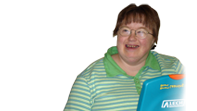Fostering Positive Outcomes: Assessing transition needs and supports for youth with disabilities in foster care
| AZ-Sonoran UCEDD | |||
| Program Type | UCEDD | Fiscal Year | 2020 |
| Contact | Jacy Farkas, MA, ABD | ||
| [email protected] | |||
| Phone | 520-626-2207 | ||
| Project Description | |||
|
The transition to adulthood can be an exciting time, as well as one of many challenges. For many young people, this is a unique period of change where they take on more responsibilities and become more independent, finding their way in the adult world. The goal and hope is for all youth to be healthy, happy, self-sufficient, contributing members of society. However, certain subsets of youth face barriers and difficulties reaching these goals. These youth are more vulnerable than "average" youth in the general population, often falling through the cracks during this journey. They need additional supports to assist them toward a healthy, productive adulthood. Youth with disabilities who are also in the foster care system are among the vulnerable populations in the United States. In spite of their unique challenges, little attention is focused on these youth as they navigate their way through multiple systems to adulthood. Research has shown that children and youth with disabilities and special health care needs (SHCN) are more likely to have undesirable experiences compared to their non-disabled peers while in care in terms of maltreatment, out-of-home placement and permanency. Although poor adult outcomes related to education, employment, health, and community participation among foster youth and youth with disabilities have been well documented for each population separately, very little information exists about those who experience both foster care and disability despite estimates that 60% of older youth (14 years and over) in care have a disability/SHCN. Despite overrepresentation in the system, little is known about these youths needs as they are often underrepresented in research and program development. The few studies that do focus on foster youth with disabilities aging out of care indicate that typical transitional and independent living services through child welfare are often not accessible or fail to meet the needs of this population. Transition for youth with special health care needs as a core outcome for primary care has been included by the Maternal Child Health Bureau since Healthy People 2000. Moreover, Healthy People 2020 saw the launch of Adolescent Health as a new topic area with a specific objective to increase the proportion of adolescents in foster care who exhibit positive early indicators of readiness for transition to adulthood, in the effort to increase the proportion of foster youth who transition to self-sufficiency upon exiting care. Through an Interagency Service Agreement with the Arizona Department of Health Services, Bureau of Womens and Childrens Health, Office of Children with Special Health Care Needs (OCSHCN), we will perform a needs assessment of foster youth with disabilities/SHCN in their transition to adulthood to explore the needs and availability of services, supports and other assistance for these youth in Arizona. The project has four major objectives: 1) Establish an Advisory Group to guide the needs assessment and provide critical feedback throughout the process. 2) Conduct an environmental review on current services and supports available to foster youth with disabilities/SCHN and those who age out in Arizona. 3) Collect and analyze data utilizing a mixed method approach from a diverse and broad group of stakeholders on the needs of foster youth with disabilities/SHCN as they transition to adulthood, particularly in the domains of health care, education, employment, community and independent living, decision-making and legal rights. 4) Disseminate findings of the needs assessment through multiple modalities. The goal of the project is to provide OCSHCN with a snapshot of the transition experience of foster youth with disabilities/SHCN in Arizona's state and tribal child welfare agencies to assist in developing its next five-year strategic plan. A statewide sample allows for the identification of needs and issues of importance to develop a statewide agenda for serving foster youth with disabilities/SHCN in their transition to adult living and aging out of the child welfare system. |
|||







